Charles E W Bean, Diaries, AWM38 3DRL 606/277/1 - 1926-1939 - Part 6
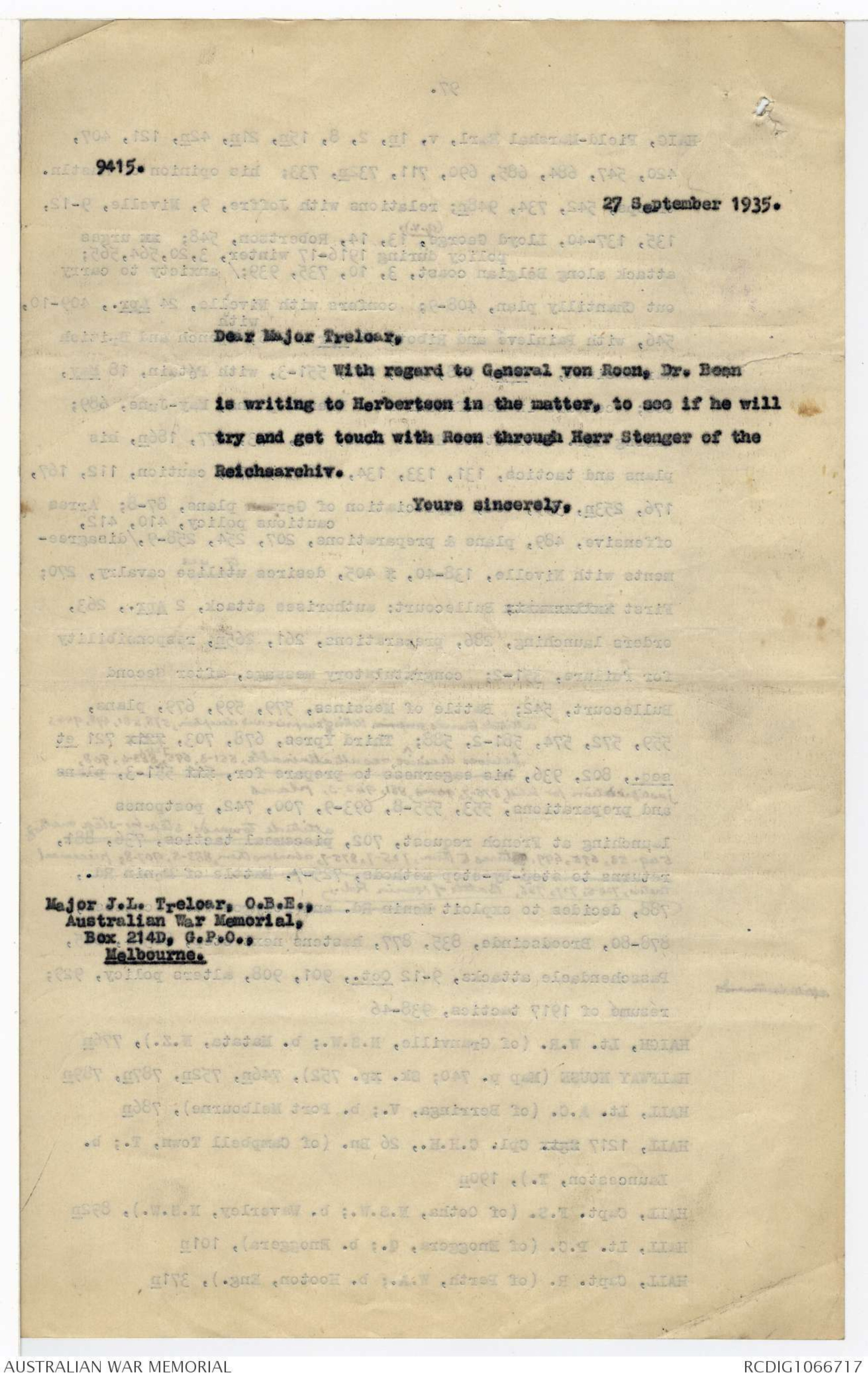
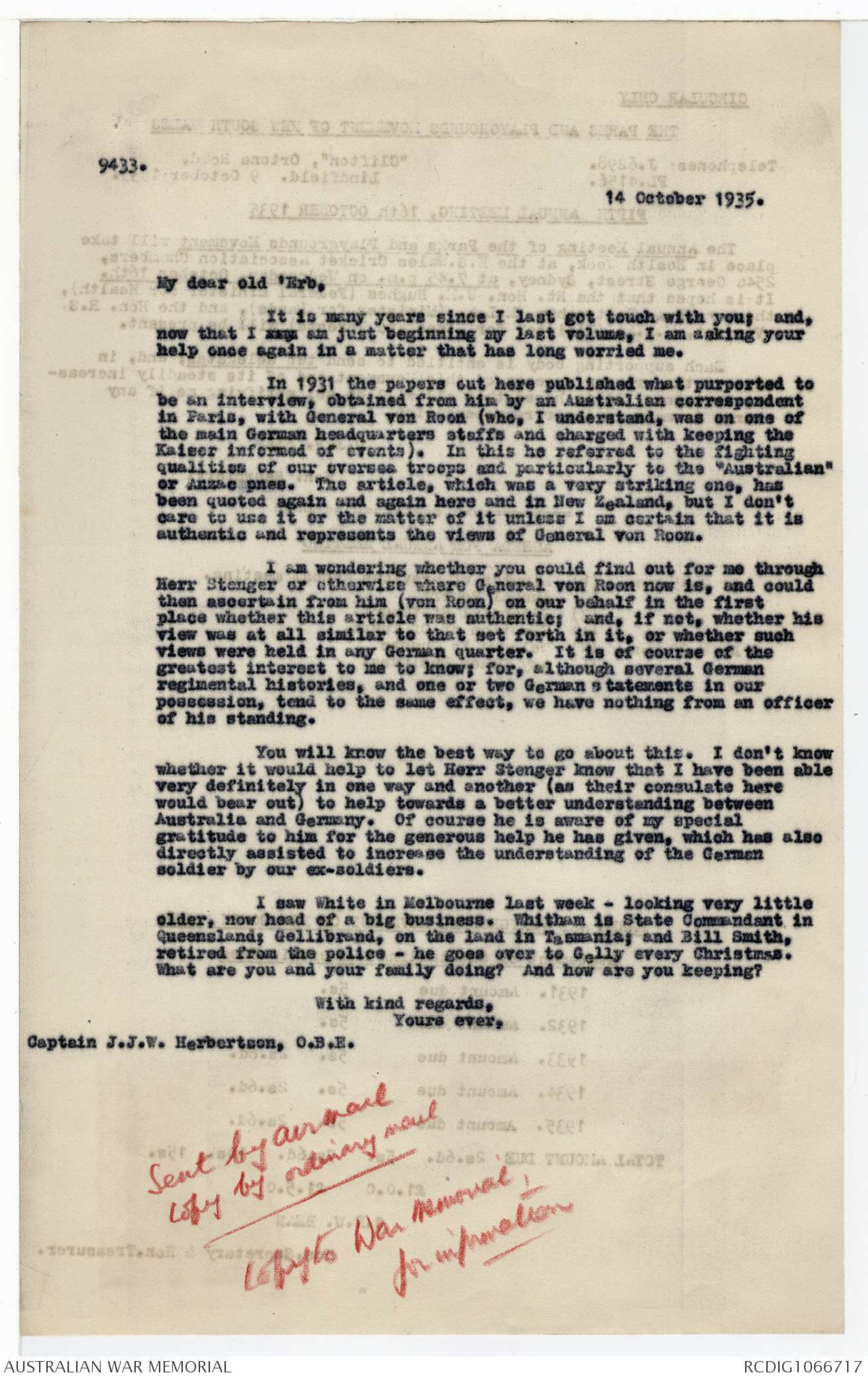
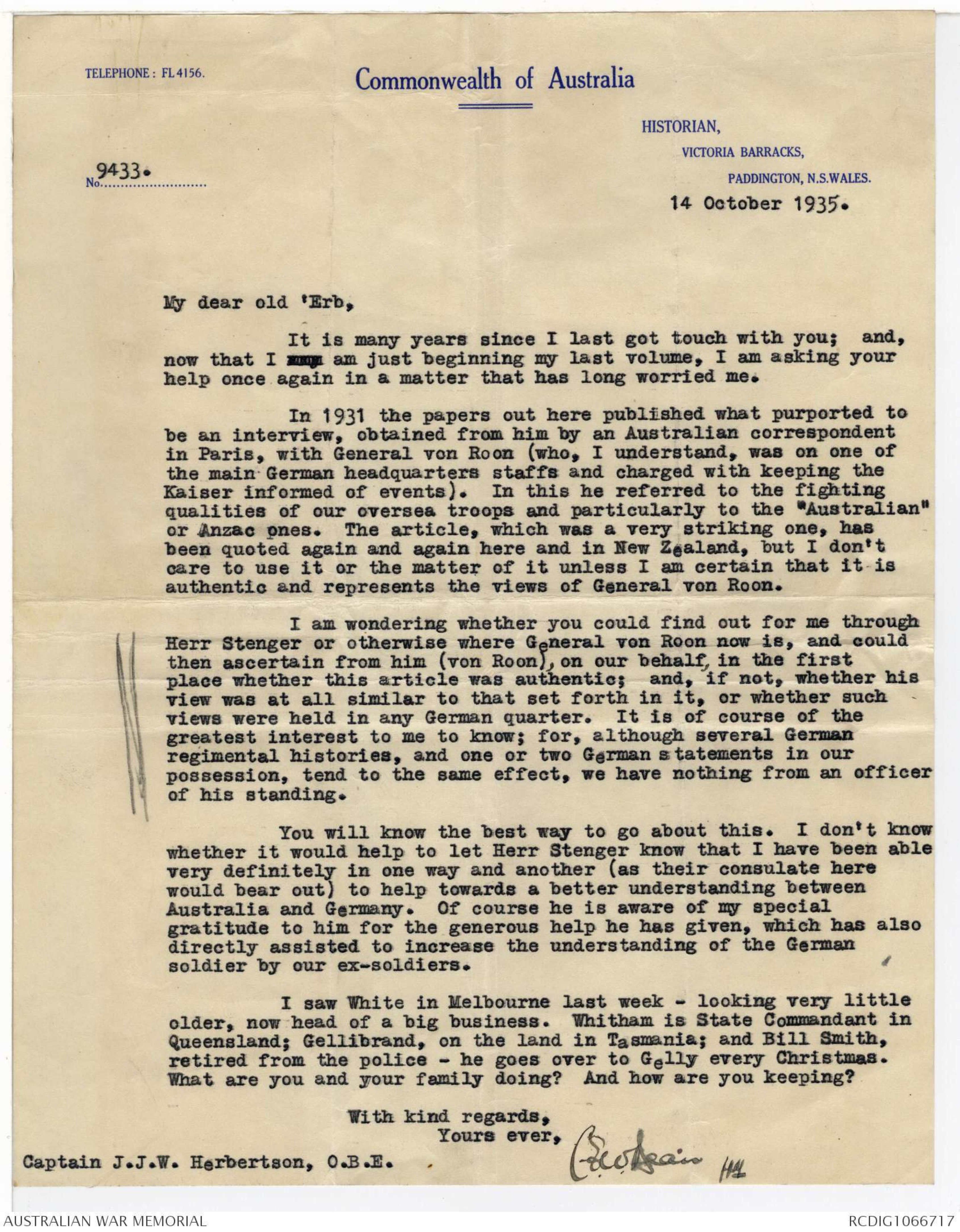
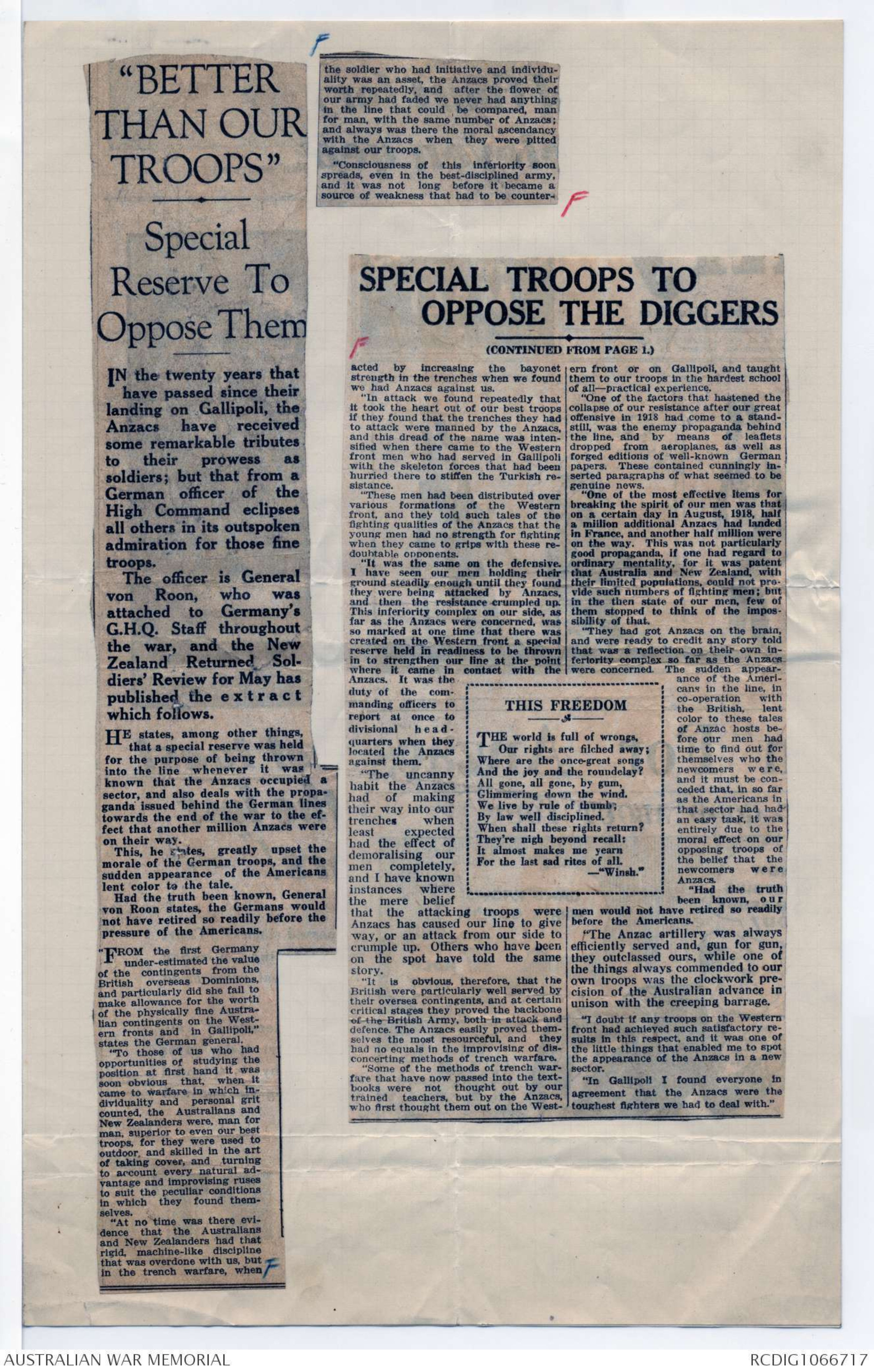
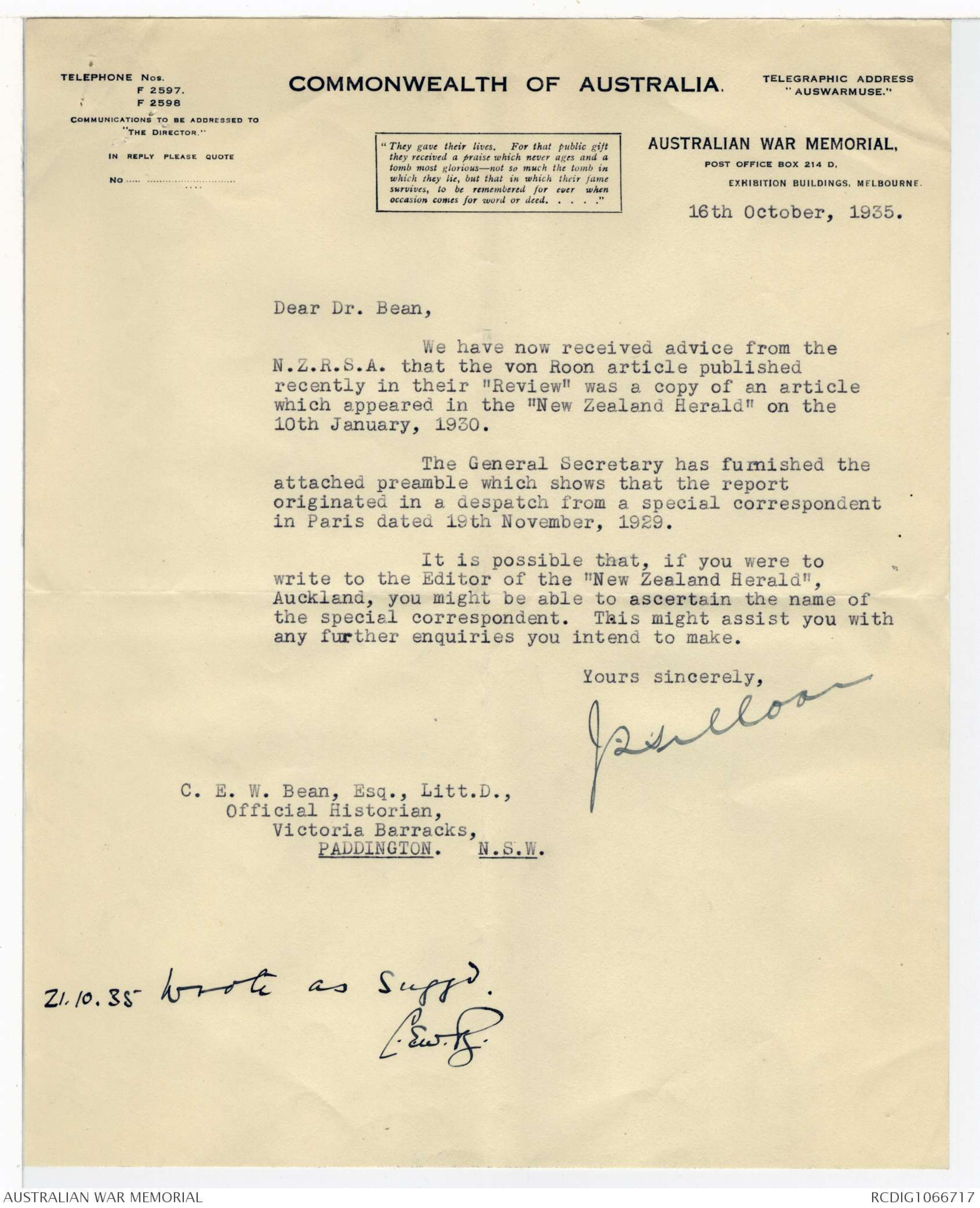
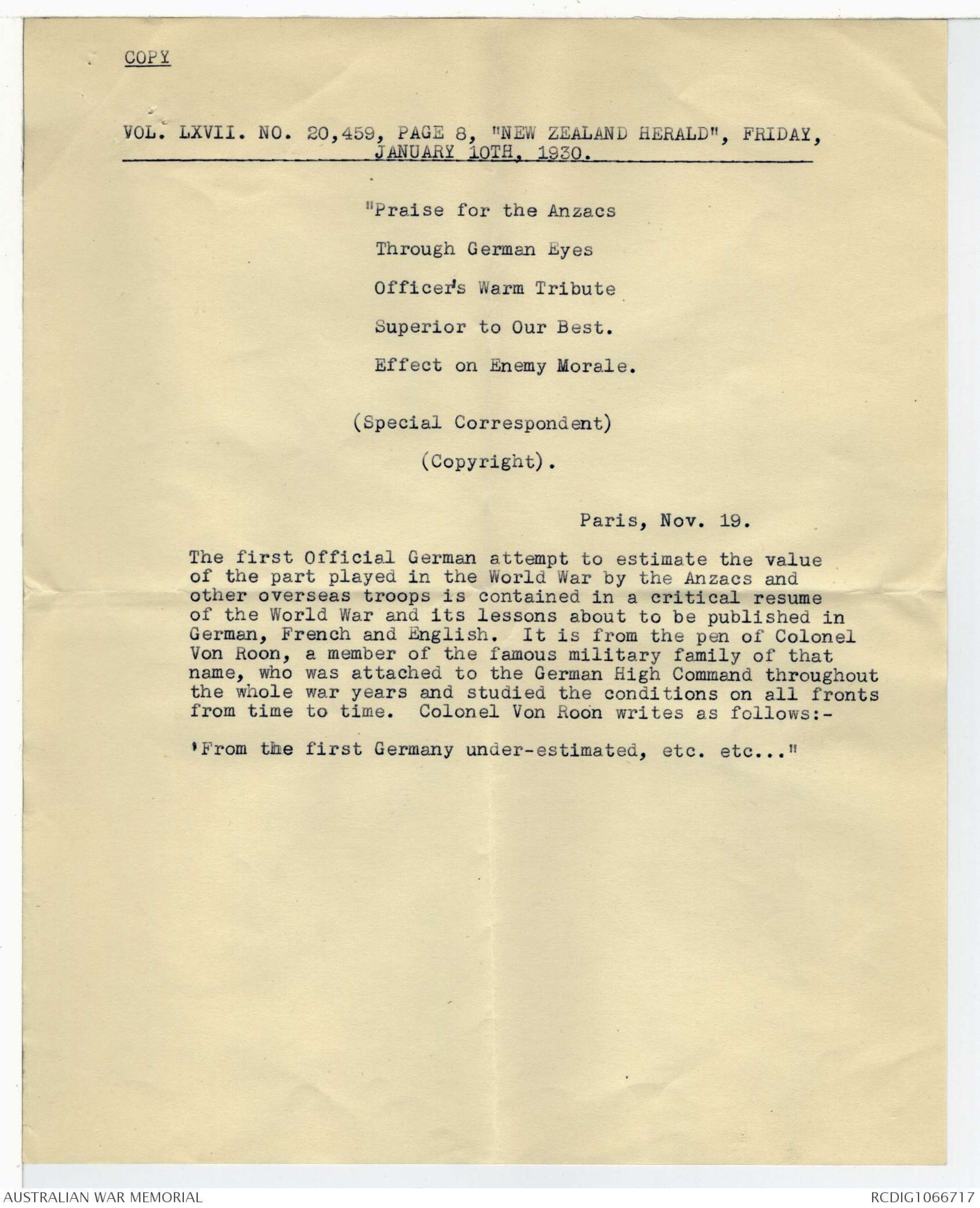
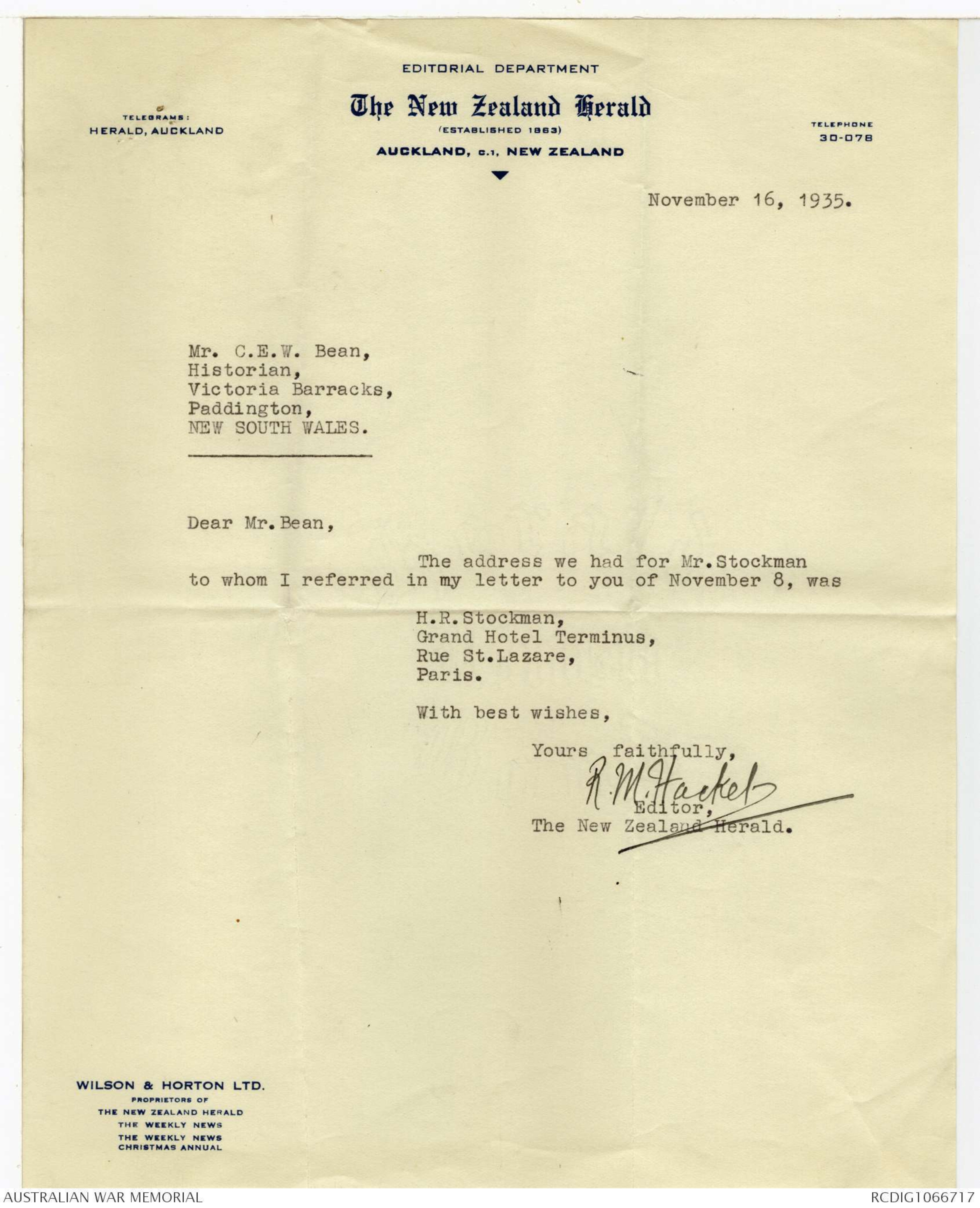
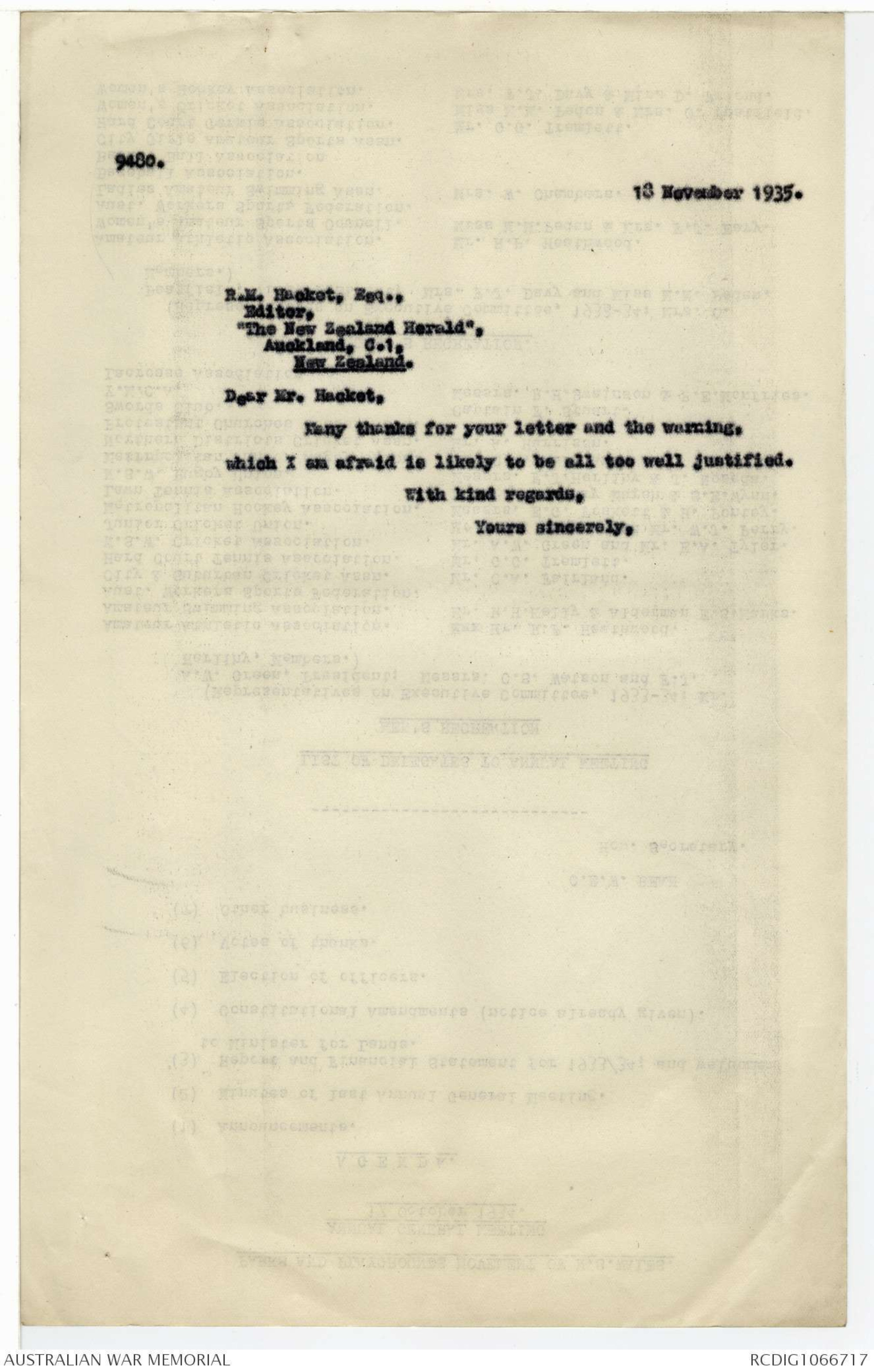
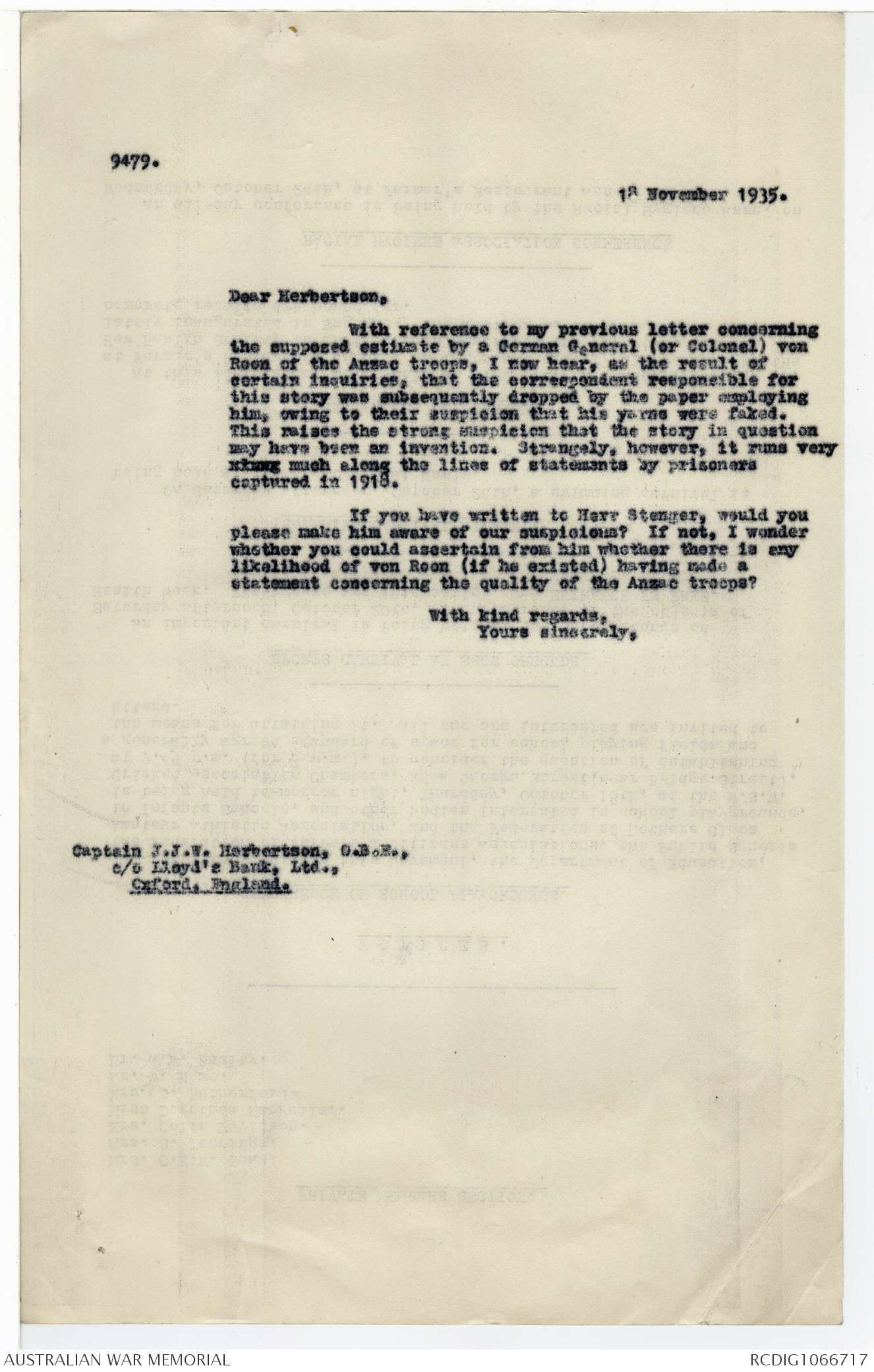
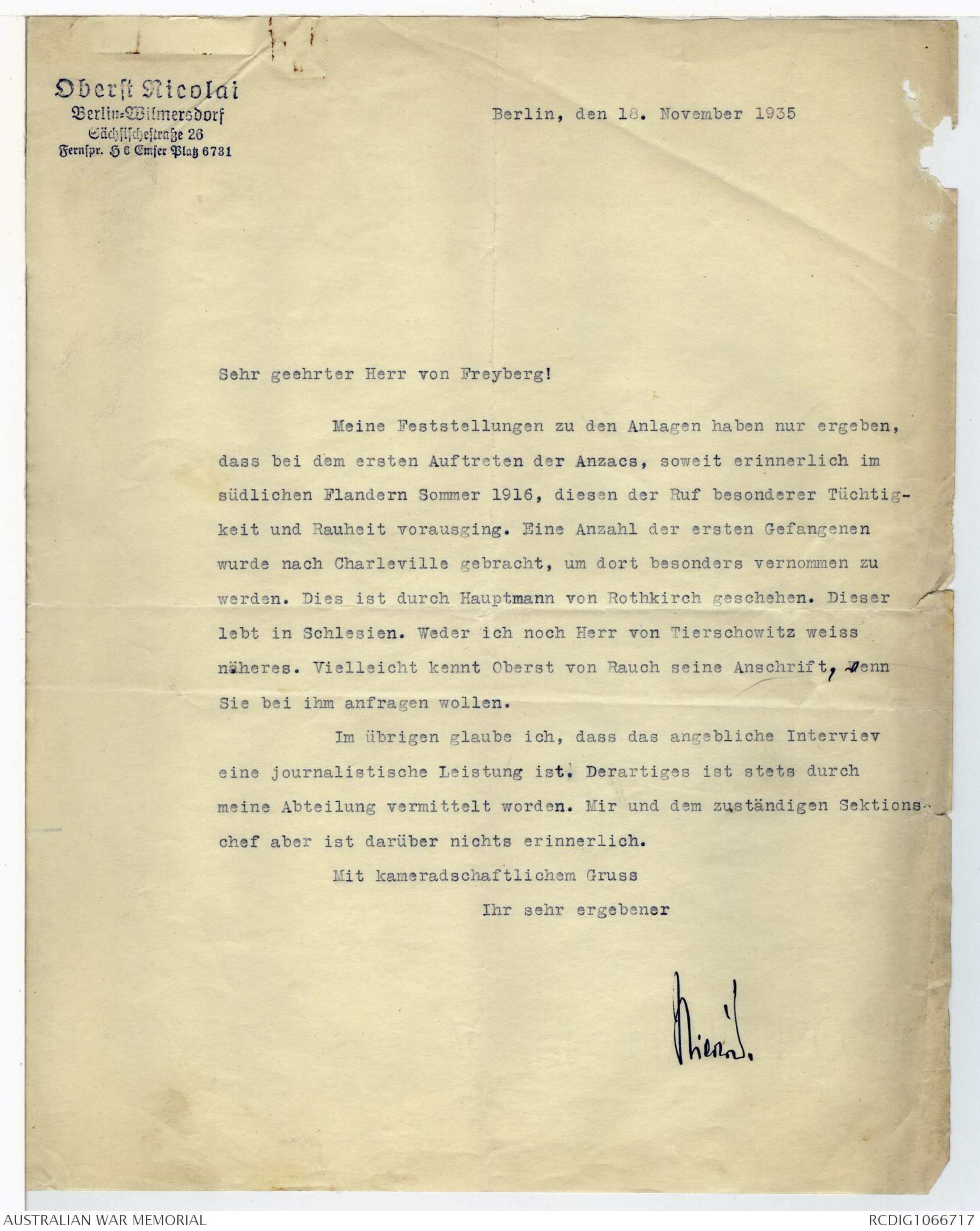
9415.
27 September 1935.
Dear Major Treloar,
With regard to General von Roon, Dr. Bean
is writing to Herbertson in the matter, to see if he will
try and get touch with Roon through Herr Stenger of the
Reichsarchiv.
Yours sincerely,
Major J.L. Treloar, O.B.E.
Australian War Memorial,
Box 214D, G.P.O.,
Melbourne.
9433.
14 October 1935.
My dear old 'Erb,
It is many years since I last got touch with you; and,
now that I xxxx am just beginning my last volume, I am asking your
help once again in a matter that has long worried me.
In 1931 the papers out here published what purported to
be an interview, obtained from him by an Australian correspondent
in Paris, with General von Roon (who, I understand, was on one of
the main German headquarters staffs and charged with keeping the
Kaiser informed of events). In this he referred to the fighting
qualities of our oversea troops and particularly to the "Australian"
or Anzac ones. The article, which was a very striking one, has
been quoted again and again here and in New Zealand, but I don't
care to use it or the matter of it unless I am certain that it is
authentic and represents the views of General von Roon.
I am wondering whether you could find out for me through
Herr Stenger or otherwise where General von Roon now is, and could
then ascertain from him (von Roon) on our behalf in the first
place whether this article was authentic; and, if not, whether his
view was at all similar to that set forth in it, or whether such
views were held in any German quarter. It is of course of the
greatest interest to me to know; for, although several German
regimental histories, and one or two German statements in our
possession, tend to the same effect, we have nothing from an officer
of his standing.
You will know the best way to go about this. I don't know
whether it would help to let Herr Stenger know that I have been able
very definitely in one way and another (as their consulate here
would bear out) to help towards a better understanding between
Australia and Germany. Of course he is aware of my special
gratitude to him for the generous help he has given, which has also
directly assisted to increase the understanding of the German
soldier by our ex-soldiers.
I saw White in Melbourne last week - looking very little
older, now head of a big business. Whitham is State Commandant in
Queensland; Gellibrand, on the land in Tasmania; and Bill Smith,
retired from the police - he goes over to Gelly every Christmas.
What are you and your family doing? And how are you keeping?
With kind regards,
Yours ever.
Captain J.J.W. Herbertson, O.B.E.
Sent by airmail
Copy by ordinary mail
Copy to War Memorial,
for information
TELEPHONE: FL4156.
Commonwealth of Australia
HISTORIAN,
VICTORIA BARRACKS,
PADDINGTON, N.S.WALES.
No9433.
14 October 1935.
My dear old 'Erb,
It is many years since I last got touch with you; and,
now that I xxx am just beginning my last volume, I am asking your
help once again in a matter that has long worried me.
In 1931 the papers out here published what purported to
be an interview, obtained from him by an Australian correspondent
in Paris, with General von Roon (who, I understand, was on one of
the main German headquarters staffs and charged with keeping the
Kaiser informed of events). In this he referred to the fighting
qualities of our oversea troops and particularly to the "Australian"
or Anzac ones. The article, which was a very striking one, has
been quoted again and again here and in New Zealand, but I don't
care to use it or the matter of it unless I am certain that it is
authentic and represents the views of General von Roon.
I am wondering whether you could find out for me through
Herr Stenger or otherwise where General von Roon now is, and could
then ascertain from him (von Roon), on our behalf, in the first
place whether this article was authentic; and, if not, whether his
view was at all similar to that set forth in it, or whether such
views were held in any German quarter. It is of course of the
greatest interest to me to know; for, although several German
regimental histories, and one or two German statements in our
possession, tend to the same effect, we have nothing from an officer
of his standing.
You will know the best way to go about this. I don't know
whether it would help to let Herr Stenger know that I have been able
very definitely in one way and another (as their consulate here
would bear out) to help towards a better understanding between
Australia and Germany. Of course he is aware of my special
gratitude to him for the generous help he has given, which has also
directly assisted to increase the understanding of the German
soldier by our ex-soldiers.
I saw White in Melbourne last week - looking very little
older, now head of a big business. Whitham is State Commandant in
Queensland; Gellibrand, on the land in Tasmania; and Bill Smith,
retired from the police - he goes over to Gelly every Christmas.
What are you and your family doing? And how are you keeping?
With kind regards,
Yours ever,
CEW Bean
Captain J.J.W. Herbertson, O.B.E.
HM
"BETTER
THAN OUR
TROOPS"
________________
Special
Reserve To
Oppose Them
_________________
In the twenty years that
have passed since their
landing on Gallipoli, the
Anzacs have received
some remarkable tributes
to their prowess as
soldiers; but that from a
German officer of the
High Command eclipses
all others in its outspoken
admiration for those fine
troops.
The officer is General
von Roon, who was
attached to Germany's
G.H.Q. Staff throughout
the war and the New
Zealand Returned Soldiers'
Review for May has
published the extract
which follows.
HE states, among other things,
that a special reserve was held
for the purpose of being thrown
into the line whenever it was
known that the Anzacs occupied a
sector, and also deals with the propaganda
issued behind the German lines
towards the end of the war to the effect
that another million Anzacs were
on their way.
This, he states, greatly upset the
morale of the German troops, and the
sudden appearance of the Americans
lent color to the tale.
Had the truth been known, General
von Roon states, the Germans would
not have retired so readily before the
pressure of the Americans.
"FROM the first Germany
under-estimated the value
of the contingents from the
British overseas Dominions,
and particularly did she fail to
make allowance for the worth
of the physically fine Australian
contingents on the Western
fronts and in Gallipoli,"
states the German general.
"To those of us who had
opportunities of studying the
position at first hand it was
soon obvious that when it
came to warfare in which individuality
and personal grit
counted, the Australians and
New Zealanders were, man for
man, superior to even our best
troops, for they were used to
outdoor, and skilled in the art
of taking cover, and turning
to account every natural advantage
and improvising ruses
to suit the peculiar conditions
in which they found themselves.
"At no time was there evidence
that the Australians
and New Zealanders had that
rigid, machine-like discipline
that was overdone with us, but
in the trench warfare, when
the soldier who had initiative and individuality
was an asset, the Anzacs proved their
worth repeatedly, and after the flower of
our army had faded we never had anything
in the line that could be compared, man
for man, with the same number of Anzacs;
and always was there the moral ascendancy
with the Anzacs when they were pitted
against our troops.
"Consciousness of this inferiority soon
spreads, even in the best-disciplined army,
and it was not long before it became a
source of weakness that had to be counter-
SPECIAL TROOPS
OPPOSE THE DIGGERS
_____________________
(CONTINUED FROM PAGE 1.)
acted by increasing the bayonet
strength in the trenches when we found
we had Anzacs against us.
"In attack we found repeatedly that
it took the heart out of our best troops
if they found that the trenches they had
to attack were manned by the Anzacs,
and this dread of the name was intensified
when there came to the Western
front men who had served Gallipoli
with the skeleton forces that had been
hurried there to stiffen the Turkish resistance.
"These men had been distributed over
various formations of the Western
front, and they told such tales of the
fighting qualities of the Anzacs that the
young men had no strength for fighting
when they came to grips with these redoubtable
opponents.
"It was the same on the defensive.
I have seen our men holding their
ground steadily enough until they found
they were being attacked by Anzacs,
and then the resistance crumpled up.
This inferiority complex on our side, as
far as the Anzacs were concerned, was
so marked at one time that there was
created on the Western front a special
reserve held in readiness to be thrown
in to strengthen our line at the point
where it came in contact with the
Anzacs. It was the
duty of the commanding
officers to
report at once to
divisional headquarters
when they
located the Anzacs
against them.
"The uncanny
habit the Anzacs
had of making
their way into our
trenches when
least expected
had the effect of
demoralising our
men completely,
and I have known
instances where
the mere belief
that the attacking troops were
Anzacs has caused our line to give
way, or an attack from our side to
crumple up. Others who have been
on the spot have told the same story.
"It is obvious, therefore that the
British were particularly well served by
their overseas contingents, and at certain
critical stages they proved the backbone
of the British Army, both in attack and
defence. The Anzacs easily proved themselves
the most resourceful, and they
had no equals in the improvising of disconcerting
methods of trench warfare.
"Some of the methods of trench warfare
that have now passed into the textbooks
were not thought out by our
trained teachers, but by the Anzacs,
who first thought them out on the Western
|
THIS FREEDOM _______________ We live by rule of thumb; For the last sad rites of all. -"Winsh." |
front or on Gallipoli, and taught
them to our troops in the hardest school
of all-practical experience.
"One of the factors that hastened the
collapse of our resistance after our great
offensive in 1918 had come to a standstill,
was the enemy propaganda behind
the line, and by means of leaflets
dropped from aeroplanes, as well as
forged editions of well-known German
papers. These contained cunningly inserted
paragraphs of what seemed to be
genuine news.
"One of the most effective items for
breaking the spirit of our men was that
on a certain day in August, 1918, half
a million additional Anzacs had landed
in France, and another half million were
on the way. This was not particularly
good propaganda, if one had regard to
ordinary mentality, for it was patent
that Australia and New Zealand, with
their limited populations, could not provide
such numbers of fighting men; but
in the then state of our men, few of
them stopped to think of the impossibility
of that.
"They had got Anzacs on the brain,
and were ready to credit any story told
that was a reflection on their own inferiority
complex so far as the Anzacs
were concerned. The sudden appearance
of the Americans
in the line, in
co-operation with
the British, lent
color to these tales
of Anzac hosts before
our men had
time to find out for
themselves who the
newcomers were,
and it must be conceded
that, in so far
as the Americans in
that sector had had
an easy task, it was
entirely due to the
moral effect on our
opposing troops of
the belief that the
newcomers were
Anzacs.
"Had the truth
been known, our
men would not have retired so readily
before the Americans.
"The Anzac artillery was always
efficiently served and, gun for gun,
they outclassed ours, while one of
the things always commended to our
own troops was the clockwork precision
of the Australian advance in
unison with the creeping barrage.
"I doubt if any troops on the Western
front had achieved such satisfactory results
in this respect, and it was one of
little things that enabled me to spot
the appearance of the Anzacs in a new
sector.
"In Gallipoli I found everyone in
agreement that the Anzacs were the
toughest fighters we had to deal with."
COMMONWEALTH OF AUSTRALIA.
TELEPHONE Nos. TELEGRAPHIC ADDRESS
F 2597. ''AUSWARMUSE."
F 2598
COMMUNICATONS TO BE ADDRESSED TO AUSTRALIAN WAR MEMORIAL.
"THE DIRECTOR." POST OFFICE BOX 214D EXHIBITION BUILDINGS, MELBOURNE
IN REPLY PLEASE QUOTE
No...... ..........................
16th October, 1935.
|
"They gave their lives. For that public gift they received a praise which never ages and a tomb most glorious-not so much the tomb in which they lie, but that in which their fame survives, to be remembered for ever when occasion comes for word or deed. . . ." |
Dear Dr. Bean,
We have now received advice from the
N.Z.R.S.A. that the von Roon article published
recently in their "Review" was a copy of an article
which appeared in the "New Zealand Herald" on the
10th January, 1930.
The General Secretary has furnished the
attached preamble which shows that the report
originated in a despatch from a special correspondent
in Paris dated 19th November, 1929.
It is possible that, if you were to
write to the Editor of the "New Zealand Herald",
Auckland, you might be able to ascertain the name of
the special correspondent. This might assist you with
any further enquiries you intend to make.
Yours sincerely,
[[?]]
C. E. W. Bean, Esq., Litt.D.,
Official Historian,
Victoria Barracks,
PADDINGTON. N.S.W.
21. 10.35 Wrote as suggd.
C.E.W.B.
COPY
VOL: LXVII. NO. 20,459, PAGE 8, "NEW ZEALAND HERALD", FRIDAY,
JANUARY 1OTH, 1930.
"Praise for the Anzacs
Through German Eyes
Officer's Warm Tribute
Superior to Our Best.
Effect on Enemy Morale.
(Special Correspondent)
(Copyright).
Paris, Nov. 19.
The first Official German attempt to estimate the value
of the part played in the World War by the Anzacs and
other overseas troops is contained in a critical resume
of the World War and its lessons about to be published in
German, French and English. It is from the pen of Colonel
Von Roon, a member of the famous military family of that
name, who was attached to the German High Command throughout
the whole war years and studied the conditions on all fronts
from time to time. Colonel Von Roon writes as follows:-
'From the first Germany under-estimated, etc. etc..."
EDITORIAL DEPARTMENT
The New Zealand Herald
(ESTABLISHED 1863)
AUCKLAND, c.1, NEW ZEALAND
TELEGRAMS:
HERALD, AUCKLAND
TELEPHONE
30-078
November 16, 1935.
Mr. C.E.W. Bean,
Historian,
Victoria Barracks,
Paddington,
NEW SOUTH WALES.
Dear Mr. Bean,
The address we had for Mr. Stockman
to whom I referred in my letter to you of November 8, was
H.R.Stockman,
Grand Hotel Terminus,
Rue St.Lazare,
Paris.
With best wishes,
Yours faithfully,
R.M. Hacket
Editor,
The New Zealand Herald.
WILSON & HORTON LTD.
PROPIETORS OF
THE NEW ZEALAND HERALD
THE WEEKLY NEWS
THE WEEKLY NEWS
CHRISTMAS ANNUAL
9480.
18 November 1935.
R.M. Hacket, Esq.,
Editor,
"The New Zealand Herald",
Auckland, C.1,
New Zealand.
Dear Mr. Hacket,
Many thanks for your letter and the warning,
which I am afraid is likely to be all too well justified.
With kind regards,
Yours sincerely,
9479.
18 November 1935.
Dear Herbertson,
With reference to my previous letter concerning
the supposed estimate by a German General (or Colonel) von
Roon of the Anzac troops, I now hear, as the result of
certain inquiries, that the correspondent responsible for
this story was subsequently dropped by the paper employing
him, owing to their suspicion that his yarns were faked.
This raises the strong suspicion that the story in question
may have been an invention. Strangely, however, it runs veryxxxxx much along the lines of statements by prisoners
captured in 1918.
If you have written to Herr Stenger, would you
please make him aware of our suspicions? If not, I wonder
whether you could ascertain from him whether there is any
likelihood of von Roon (if he existed) having made a
statement concerning the quality of the Anzac troops?
With kind regards,
Yours sincrely,
Captain J.J.W. Herbertson, O.B.E.,
c/o Lloyd's Bank, Ltd.,
Oxford. England.
Oberft Nicolai
Berlin=Wilmersdorf
Sächsischestraße 26
Fernspr. S 6 Emser Blaß 6731
Berlin, den 18. November 1935
Sehr geehrter Herr von Freyberg!
Meine Feststellungen zu den Anlagen haben nur ergeben,
dass bei dem ersten Auftreten der Anzacs, soweit erinnerlich im
südlichen Flandern Sommer 1916, diesen der Ruf besonderer Tüchtigkeit
und Rauheit vorausging. Eine Anzahl der ersten Gefangenen
wurde nach Charleville gebracht, um dort besonders vernommen zu
werden. Dies ist durch Hauptmann von Rothkirch geschehen. Dieser
lebt in Schlesien. Weder ich noch Herr von Tierschowitz weiss
näheres. Vielleicht kennt Oberst von Rauch seine Anschrift, Venn
Sie bei ihm anfragen wollen.
Im übrigen glaube ich, dass das angebliche Interviev
eine journalistische Leistung ist. Derartiges ist stets durch
meine Abteilung vermittelt worden. Mir und dem zuständigen Sektions
chef aber ist darüber nichts erinnerlich.
Mit kameradschaftlichem Gruss
Ihr sehr ergebener
Thiern
 Sam scott
Sam scottThis transcription item is now locked to you for editing. To release the lock either Save your changes or Cancel.
This lock will be automatically released after 60 minutes of inactivity.